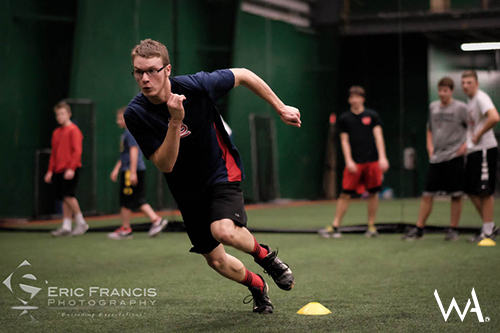
Staying mentally strong
Other Blogs
-
10/22/2025 10:11 PM
Empowering Female Athletes. Youth Basketball & Soccer Performance in Omaha
-
10/22/2025 9:57 PM
High School Football Playoffs: Mental Preparation Tips | Warren Academy Omaha
-
10/30/2024 1:58 PM
Breaking Down Plyometric Training: How to Build Explosive Power for Football
-
10/23/2024 12:00 PM
Offseason Training: Why Speed And Agility Matters
-
10/16/2024 12:05 PM
Functional Strength: Why Athletes Need More Than Just Lifting Weights
-
10/9/2024 12:07 PM
The Role of Flexibility in Sports: Why It’s Key to Preventing Injuries
-
10/2/2024 12:09 PM
Preventing Burnout In High School Athletes
-
9/11/2024 1:34 PM
Injury Prevention 101: Keeping Football Athletes Safe and Healthy During the Season
-
8/28/2024 2:35 PM
Stability Training: What It Is & Why It’s Beneficial
-
8/14/2024 12:16 PM
Injury Prevention Strategies for High School Football Players
-
8/7/2024 10:15 AM
In-Season Recovery Tips
-
7/31/2024 12:10 PM
Why In-Season Strength Training Is Crucial For Football Athletes
-
7/24/2024 1:24 PM
Developing Leadership Skills: Becoming a Leader On and Off the Field
-
7/17/2024 12:37 PM
Athlete Qualities That Make You GREAT
-
7/10/2024 12:03 PM
Benefits Of Playing Multiple Sports In High School
-
7/3/2024 11:51 AM
Fuel Your Body: Essential Tips For Athletes
-
6/19/2024 9:33 AM
Tips on building confidence on and off the field
-
6/12/2024 10:09 AM
Mobility vs Flexibility
-
6/5/2024 3:15 PM
Summer Training Essentials
-
5/29/2024 4:20 PM
Position-Specific Training: Tailoring Workouts for Football Players
-
5/22/2024 12:55 PM
Staying Motivated During Offseason Training
-
5/15/2024 1:52 PM
Functional Movement Training: Improving Mobility and Stability for Athletic Performance
-
5/1/2024 9:45 AM
Summer Training Essentials: Staying Active and Improving Skills During the Offseason
-
4/24/2024 1:05 PM
Preventing Injuries: Conditioning and Injury Prevention Drills for Running Backs
-
4/10/2024 12:34 PM
Acceleration vs Speed: Why athletes need both
-
4/3/2024 12:34 PM
The role of carbohydrates in post-workout recovery
-
3/27/2024 1:41 PM
Mental Toughness Training: Building Resilience In Young Athletes
-
3/20/2024 9:03 AM
Why Strength Training is Vital For Athlete Development
-
3/13/2024 7:52 AM
Offseason Injury Prevention: Ways To Keep Your Body Safe
-
2/28/2024 12:30 PM
Speed Development Strategies: Enhancing Athletic Performance for Football Players
-
2/28/2024 9:11 AM
Defensive Technique: Training Tips For D-Line, LBs and DBs
-
2/21/2024 12:45 PM
Maximizing Offseason Gains: A Guide for High School Football Players
-
2/14/2024 2:39 PM
Speed and Strength: The Cornerstone for Football Athletes
-
2/7/2024 12:17 PM
The Warren Academy Game Changer Program
-
1/24/2024 9:05 AM
Private Position Training At Warren Academy
-
1/17/2024 4:05 PM
Welcome To Our New Website!
-
2/1/2023 1:49 PM
Benefits of training as a team
-
1/25/2023 11:13 PM
Why Athletes Need Strength Training
-
1/18/2023 12:16 PM
Offseason Football Training Overview
-
1/11/2023 10:22 AM
Unsigned Senior & Top Prospects Showcases
-
1/4/2023 12:16 PM
Athlete New Year’s Goals
-
12/21/2022 11:33 AM
Stay Motivated This Offseason
-
12/14/2022 10:42 AM
College Showcase Tips
-
12/7/2022 11:54 AM
The Benefits Of Speed And Agility Training For Young Athletes
-
11/30/2022 12:23 PM
Importance Of A Strong Core
-
11/17/2022 3:15 PM
Advantages Of Playing Multiple Sports
-
11/11/2022 1:30 PM
Setting Athlete Goals
-
11/3/2022 2:59 PM
Start Your Offseason Off Stong
-
10/26/2022 12:40 PM
Qualities All Great Athletes Encompass
-
10/19/2022 11:23 AM
How Young Athletes Can Deal With Failure
-
10/5/2022 1:42 PM
Athlete Recovery Tips
-
9/21/2022 1:18 PM
Ways Athletes Can Stay Confident In Themselves
-
8/25/2022 8:26 AM
The Importance Of Athlete Stretching
-
8/18/2022 11:43 AM
How To Be The Best Teammate
-
8/3/2022 11:52 AM
Managing Sports and School
-
7/27/2022 11:54 AM
How Athletes Can Make A Great First Impression
-
7/20/2022 12:15 PM
Qualities Of A Leader
-
7/6/2022 12:32 PM
The Benefits Of Being A Multi-Sport Athlete
-
6/29/2022 11:45 AM
Summer Agility Drills
-
6/22/2022 11:18 AM
Staying Motivated During Summer Training
-
6/1/2022 11:39 AM
Nutrition For Faster Injury Recovery
-
5/25/2022 12:16 PM
How Are You Preparing For Your Workouts?
-
5/18/2022 11:45 AM
Summer Training Tips
-
5/4/2022 11:33 AM
Why Core Strength Is Essential For Optimal Performance
-
4/20/2022 12:52 PM
The Benefits of Resistance Training for Athletes
-
4/6/2022 11:25 AM
Best Ways To Build Speed
-
3/23/2022 12:25 PM
Why Sport-Specific Training is Beneficial to Athletes
-
3/9/2022 12:32 PM
How To Tell When Your Are Overtraining
-
2/16/2022 11:50 AM
How To Manage Being A Multi-Sport Athlete
-
2/2/2022 4:12 PM
Athlete Recruiting Tips
-
1/19/2022 11:00 AM
Ways Athletes Can Build Strength
-
1/5/2022 11:24 AM
Ways To Stay Motivated And Focused During The Offseason
-
12/15/2021 11:51 AM
Ways To Improve Acceleration
-
12/1/2021 12:02 PM
UPDATED: Reasons To Play 7v7 During The Offseason
-
11/17/2021 11:19 AM
The Importance Of Attending Football Camps
-
11/3/2021 11:34 AM
How To Tackle Your Offseason
-
10/20/2021 10:58 AM
How Yoga Benefits Athletes
-
10/6/2021 10:34 AM
Recruiting Tips For High School Athletes
-
9/22/2021 2:11 PM
Athlete Tips: Dealing with failure
-
9/8/2021 10:44 AM
Benefits Of In-Season Training
-
8/25/2021 11:25 AM
How To Manage Your Time As A Student Athlete
-
8/11/2021 9:35 AM
How To Impress Coaches Early In The Season
-
7/14/2021 10:45 AM
Tips On Mentally Preparing For A New Season
-
6/30/2021 9:30 AM
Football Summer Agility Drills
-
6/16/2021 10:48 AM
Things Athletes Need In Order To Become Great
-
6/2/2021 10:25 AM
The Importance Of Good Nutrition When Injured
-
5/19/2021 10:48 AM
Tips On Staying Motivated Throughout The Summer
-
5/5/2021 10:59 AM
How Any Athlete Can Become A Great Leader
-
4/21/2021 10:51 AM
How Youth Sports Help Teach Life Skills
-
4/7/2021 10:51 AM
Benefits of Team Training
-
3/10/2021 10:43 AM
Ways To Be A Good Teammate
-
2/24/2021 10:40 AM
Mobility vs. Flexibility: What’s the Difference?
-
2/10/2021 10:35 AM
Benefits of Resistance Training
-
1/27/2021 9:28 AM
How to make yourself stand out at tryouts
-
1/13/2021 10:54 AM
College Recruiting Tips for Athletes
-
12/23/2020 11:03 AM
Benefits of Strength and Conditioning Programs
-
12/9/2020 10:56 AM
How Speed and Agility Training Benefits Athletes
-
11/25/2020 11:38 AM
Why stretching is important for every athlete
-
11/11/2020 10:39 AM
Benefits of Sport-Specific Training
-
10/28/2020 11:01 AM
Off-Season Training Tips
Staying mentally strong
https://www.warrenacademy.com/images/uploads/content/_resized/652b71ca-09b7-4703-b93e-feb7dbee58cb.jpg
Omaha Media Group https://www.omahamediagroup.com/images/uploads/monster_gallery/Omaha-Media-Group-Black.jpg
OMG Admin
https://www.omahamediagroup.com/images/uploads/monster_gallery/Omaha-Media-Group-Black.jpg
OMG Admin

 https://www.omahamediagroup.com/images/uploads/monster_gallery/Omaha-Media-Group-Black.jpg
OMG Admin
https://www.omahamediagroup.com/images/uploads/monster_gallery/Omaha-Media-Group-Black.jpg
OMG Admin

As basketball teams across the country are gearing up for conference championships and March Madness, competition is getting tough. So what sets elite athletes apart from the rest?
The presence of mental toughness is one undeniable factor. Athletes who posses growth mindset and are mentally tough possess the ability to disregard negative outcomes or adversity; they have the ability to control their emotions and silence the voice inside their head that says something is impossible.
When you possess the qualities required for growth mindset and are mentally tough, you are able to go beyond the limits in your mind in order to take yourself to higher levels.
Persistence
No season is ever perfect, there are going to be ups and downs, wins and losses. How does an athlete handle themselves in the bad times? They persist. Instead of backing off in the face of adversity, the mentally tough athlete faces it head on.
When they experience a loss, mistake or pressure - do they give up? NO! A mentally tough athlete will rebound from failure and adversity in order to be better. Athletes grow and develop from the ups and downs of sport by persisting through the tough times. They are able to stay consistent and push themselves.
Control
All mentally tough athletes feel they control their performance regardless of external forces. They possess an unshakeable faith that they can control their own performance and they remain unaffected by competition or adversity. In their minds, the identity of the opponent does not matter; they will still play their best.
An athlete who isn’t mentally tough may give control to their opponents, teammates or coaches. This ultimately affects their performance by surrendering their power and shifting their focus.
Instead of losing their focus after a bad call from the referee, a mentally tough athlete can keep their cool and focus on the next play. No matter what, they feel and act as if they can influence the competition and outcome of the situation.
Challenges
When you are the fifth or sixth place team facing the undefeated first place team, are you upset or excited about the opportunity? Any mentally tough athlete would state that they are excited to face the best team because they enjoy the challenge.
Instead of wanting to play a worse opponent, someone who is mentally tough wants to play an opponent who will challenge them. The underdog who plays a challenging team does not see this opportunity as a threat; rather, the athlete perceives an opportunity to grow and develop.
An athlete’s desire for a challenge directly correlates to their perception of an opportunity to grow and develop. The desire for a challenge directly correlates to their perceived control because they are unaffected by the opponent. They are not complacent. Instead, they want to push their limits.
Confidence
Both control and the desire for challenge would not be possible without self-confidence. A strong sense of self-belief is a quality that will be found in all mentally tough athletes.
How could they challenge themselves to compete with the best if they do not believe they can succeed? Athletes who don’t believe in their abilities want to play an opponent who at a lower skill level because they do not have the confidence to take on a challenge or can’t handle losing.
By having high self-confidence and growth mindset, athletes are able to constantly improve because they challenge themselves regularly. Furthermore, self-belief allows athletes the play at their best no matter what everyone else is doing.
DREAM, one of the Midwest’s well-known youth mentoring organizations, provides life-changing and life-enriching experiences to at-risk youth through mentoring and after-school programs in Omaha, Nebraska, and Springfield, Missouri. Their proven approach puts children in a comfortable setting where they’re encouraged to discuss openly, learn, and grow as individuals. Are you interested in getting involved with DREAM? Contact us today.







